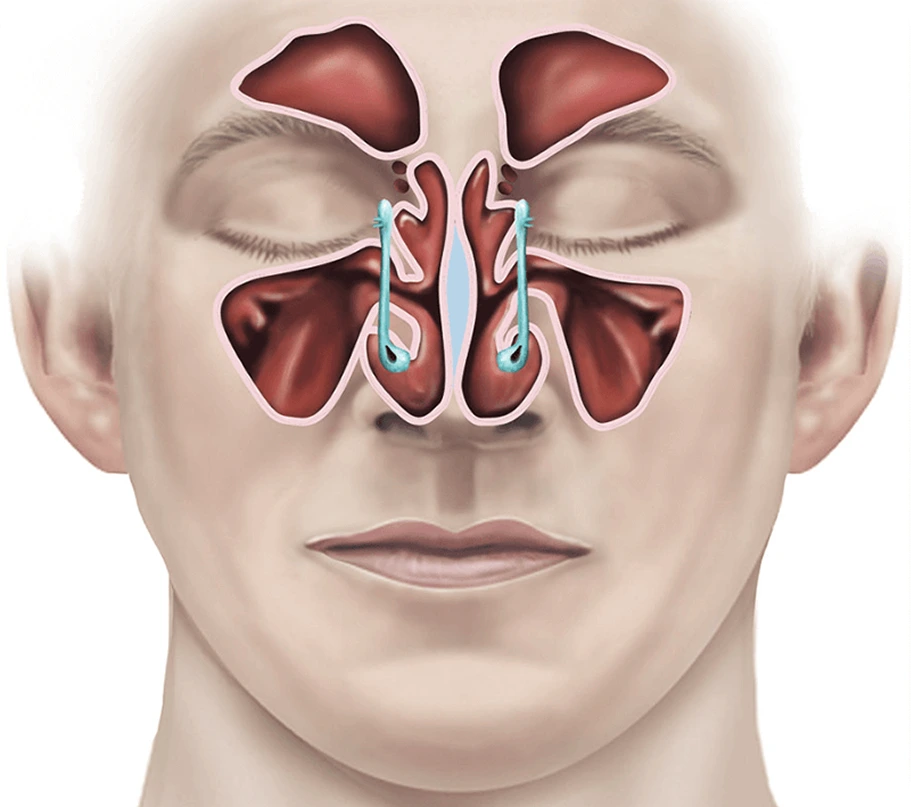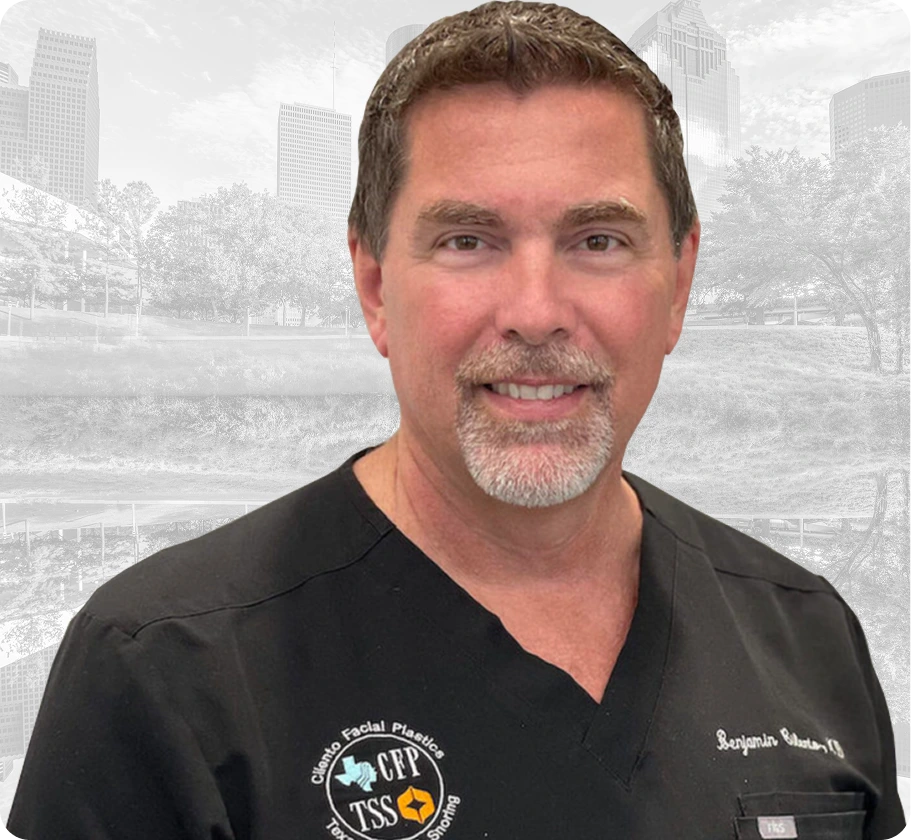Functional Endoscopic Sinus Surgery (FESS) in Houston, TX
Chronic sinus infections, persistent congestion, and difficulty breathing can disrupt daily life. Functional endoscopic sinus surgery, or FESS, offers a minimally invasive solution for those whose symptoms have not improved with medications, targeting the underlying causes to restore sinus function. This procedure can help reduce discomfort, prevent future infections, and improve overall breathing and quality of life.
Schedule a consultation at Texas Sinus & Snoring to receive a professional FESS.

What Is Functional Endoscopic Sinus Surgery (FESS)?
Functional endoscopic sinus surgery (FESS) is an endoscopic procedure performed entirely through the nostrils. The procedure enlarges the drainage pathways of the sinuses and removes inflammatory tissue. We use the latest video-aided technology, called an endoscope.
For safety and accuracy, Dr. Cilento also uses the most advanced CT guidance technology available in Houston. CT guidance allows the surgeon to see precisely where his instruments are in real time while operating.
Consultation and Testing
Your journey to relief begins with a comprehensive consultation at Texas Sinus & Snoring. During your visit, Dr. Cilento will review your medical history, including any previous sinus surgery, and discuss your symptoms to determine whether you may be experiencing chronic sinusitis. A thorough evaluation is essential to guide the diagnosis and develop a personalized treatment plan.

FESS Procedure: A Step-by-Step Overview
Anesthesia
FESS can be performed using either local anesthesia or general anesthesia, depending on your comfort and the extent of surgery. Local anesthesia numbs the nasal passages while you remain awake, allowing you to feel minimal discomfort. General anesthesia puts you fully to sleep, providing complete comfort for more extensive procedures. Dr. Cilento will determine the safest and most effective option.
Accessing the Nasal Passages
Opening the Sinus Cavities
Use of Video and Imaging Technology
What Are the Results of FESS?
Most patients experience decreased facial pressure, pain, headache, nasal drainage, post-nasal drip, and an improved sense of smell and nasal breathing. We see this significant reduction in symptoms as a cure. This result is attainable in roughly 95% of patients after surgical intervention.
The most variable result is with the sense of smell. The sense of smell is the most delicate sense we have. It can be altered or damaged by infection, allergy, medications, or trauma. The sense of smell may already have been irreparably damaged by polyps, medications, viruses, infections, trauma, or inflammation before the surgery. Therefore, your sense of smell may not return fully, even after a FESS.
Recovery and Aftercare Tips
Typical Recovery Timeline
- First 24–48 hours: Rest at home and monitor for any significant bleeding. Use prescribed medications as directed.
- Days 3–7: Swelling may peak during this period. Continue nasal irrigations and follow detailed instructions to prevent post-operative infection.
- Week 1–2: Mild discomfort may persist. Oral steroids may be used if recommended, and antibiotics should be utilized as prescribed.
- Weeks 2–4: Nasal cavities begin to feel clearer. Most patients can resume light activities while avoiding strenuous exercise.
- Month 1: Swelling should subside significantly. Continue nasal care routines as instructed.
- Months 2–3: Healing is usually complete, though occasional minor congestion may remain. Follow-up visits ensure proper recovery and address any complications.

Who Benefits from FESS?
Nasal polyps are growths on the lining of the nose or sinuses. They often cause chronic inflammation. Causes of nasal polyps include seasonal allergies, chronic sinus infections, asthma, and, in some cases, drug sensitivity or immune disorders.
Allergic fungal disease, also known as allergic fungal sinusitis (AFS), is a condition characterized by inflammation of the sinuses. It is a common fungal infection in the sinuses. Because of Houston’s humid climate and long allergy season, allergic fungal disease is very common.
FESS is also an option for the few patients who have failed a previous balloon sinuplasty (roughly 2-5%).

Benefits of FESS
Benefits of FESS
- Reduces the frequency of recurrent acute sinusitis by improving drainage and removing obstructions.
- Restores the natural function of the nasal passages and sinus cavities for better breathing.
- Helps alleviate symptoms related to chronic allergies and supports long-term sinus health.
- Minimizes reliance on medications for sinus infections and congestion.
- Improves overall comfort and daily functioning by decreasing nasal pressure and congestion.
Are There Any Possible Risks or Complications?
Each surgical procedure carries some probability of complications. Headache, bleeding, scarring, and re-operation are the most common risks of FESS, but they are easily managed. Rarely, damage to the structures surrounding the sinuses, such as the eye, brain, and teeth, may occur.
Texas Sinus & Snoring uses the latest image-guidance technology to ensure we protect you as much as possible.
Cost of FESS in Houston, TX


Address Your Sinus Problems with Advanced FESS Procedures
Take control of your sinus health with advanced FESS procedures. Our ENT physician, Dr. Cilento, provides comprehensive care using the latest minimally invasive techniques to relieve chronic sinus issues and improve breathing.
Frequently Asked Questions (FAQs)
Do you perform CT scans and other imaging tests before surgery?
Yes. Before FESS, we perform CT scans and other imaging tests to evaluate the underlying causes of your sinus symptoms and assess any nasal obstruction. These tests are essential for identifying structural issues or inflammation that could increase your risk of complications during surgery. Proper imaging ensures that the procedure is safe, precise, and tailored to your needs.
Can I combine FESS and turbinate reduction or septoplasty?
Absolutely. FESS can be combined with turbinate reduction or septoplasty for patients suffering from nasal congestion, a deviated septum, or enlarged turbinates. This approach allows the surgeon to improve sinus openings, correct the nasal septum, and treat multiple issues in a single procedure. Combining procedures often results in better long-term relief and improved overall breathing.
Is FESS more comprehensive than balloon sinuplasty?
Yes. The primary goal of FESS is to provide thorough surgical treatment of the sinus cavities. Unlike balloon sinuplasty, which mainly addresses minor blockages, FESS targets inflamed tissue, widens sinus openings, and relieves persistent sinus pressure. Patients often experience significant symptom improvement that cannot be fully resolved with balloon procedures alone.

